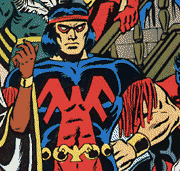The problem:
For an industry famous for tales packed full of muscles and melodrama, the situation has prompted an unusual amount of soul searching. The would-be villains are many. Some have blamed the sales slide on cultural upstarts, like video games, manga and the ever-present Internet. Others point to the increased popularity of bookstore-friendly graphic novels, sales of which have recently surpassed traditional comics.
But there are those who have begun to ask more complex questions, like how characters that are 40, or even 70, years old can remain relevant in an increasingly diverse society. This raises one of the oldest and most uncomfortable truths about the superhero genre: its surprising dearth of non-white heroes, particularly black ones.
Just ask Reginald Hudlin. The writer and director behind such films like House Party and Boomerang and TV shows like Everybody Hates Chris has been frustrated for decades by what he sees as the gross under-representation of black heroes in comics. A comic fan since he was a kid (he owns more than 30,000) and the current writer behind Marvel's Black Panther title, Hudlin is perplexed by how one of the oldest and most "pop" of all popular cultures could remain so whitewashed.
"In every other medium, the most successful concept or product is black. Whether it's music, movies, TV shows: out of the top 10, four of them are black," he says from his office at Black Entertainment Television, where he is an executive. "Who are the biggest movie stars? Jamie Foxx, Will Smith, Denzel Washington, Eddie Murphy. Only in comics are blacks so under represented. Somehow, in this medium people are so out of touch with popular culture that they don't understand that black culture is popular culture."
Leopold Campbell, a 34-year-old vice-principal and die-hard superhero fan, has an easy solution: write better stories. Campbell, who has been reading comics since he was "a working-class black kid" in Toronto, says comic fans of all colours get hooked on them for one reason, the addictive nature of serialized storylines--many of which involve complex plots and take years to resolve.
Most black comics, on the other hand, "are insulting to the intelligence," he says. "The problem is, black characters always have to be protest characters... They're always arguing about something or they're always angry, and it always has to do with race. So they're fixed within one specific subject."




2 comments:
I've heard conflicting claims about comic-book sales. I asked my local dealer about them and he said the numbers have been up and down in recent years, but level overall. I wonder if publications like Entertainment Weekly are confusing the popularity of comics made into movies with actual sales.
Good point that any statistics have to take the increased price of comics into account. The figures to look at include dollar value of comics sold, inflation-adjusted dollar value of comics sold, and number of comics sold. I'm pretty sure a trade magazine could tell us these numbers and thus answer our questions.
But I believe the article is correct in saying the long-term trend (over several decades) is downward. What with the competition from video games and the escalating prices, I don't see it going up again. I doubt comics will ever be the mass medium they once were.
Record earnings doesn't mean record comic-book sales. Both companies earn tons of money from licensing and related products such as movies and games. I doubt they get the majority of their income from comics anymore.
Marvel is part of Marvel Entertainment Inc., a publicly owned company. DC is part of Time Warner. This description of Marvel suggests how publishing is only a small part of the business now:
http://www.business.com/directory/media_and_entertainment/publishing/magazines/marvel_entertainment_group,_inc/profile
Marvel Entertainment Group, Inc. is a diversified, youth entertainment company featuring content based on developing, creating powerful brand equity of the more than 3,500 characters, among them are Spiderman and X-man, and other major sports and entertainment properties. The company conducts its business in three ways. One, direct operations such as Marvel Comics Group, Fleer/SkyBox, Panini and the newly created Marvel Software. Two, through relationships such as its equity interest in Toy Biz and its themed restaurant joint venture with Planet Hollywood. Three, licensing of Marvel characters to develop TV series and feature films, videogames, advertising promotions, apparel and consumer products. The company acquired some companies like Skybox, Panini and others in 1995.
Post a Comment